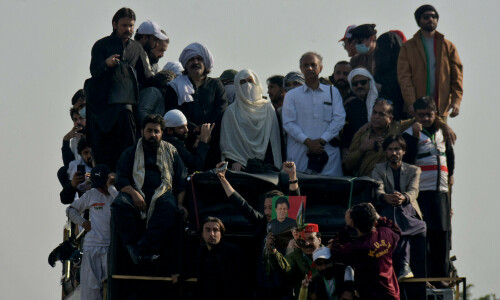WASHINGTON, Sept 27: President George W. Bush was to go with full strength to a dinner he was hosting on Wednesday night (early Thursday morning PST) at the White House to bridge disagreements between Pakistan and Afghanistan, two key allies in the US-led war against terror.
The Bush team that will try to persuade the Afghan and Pakistani leaders to work together includes Vice-President Dick Cheney, Secretary of State Condoleezza Rice and National Security Adviser Stephen J. Hadley.
President Pervez Musharraf and his Afghan counterpart Hamid Karzai, however, have been asked to come only with their ambassadors. Till Wednesday afternoon, the Pakistan Embassy was trying to include Foreign Minister Khurshid Mehmood Kasuri in the team.
Mr Cheney and Ms Rice are both tough negotiators while as national security adviser, Mr Hadley has access to all the information US intelligence agencies might have gathered about the situation in Afghanistan and along the Pakistan-Afghan border.
It seems that President Bush is not only interested in listening to what his guests have to say about each other but also wants to confront them with the information collected by his agencies.
Mr Cheney and Ms Rice will be expected to persuade the two leaders to forego their differences and agree to a common strategy to calm Afghanistan which Washington fears may become another Iraq if not controlled.
This intimate dinner at the old family dining room of the White House has “all the earmarks of a peace conference,” says Washington Post.
It also notes that the Afghan and Pakistani leaders “have been sniping at each other from long-distance for months,” forcing Mr Bush to dispatch Ms Rice to Kabul and Islamabad last June to try to ease tensions.
Although a wily negotiator, Ms Rice apparently failed to bridge the differences. Tensions increased as Afghanistan became increasingly unstable and crisis-ridden.
Judged by the media statements President Musharraf and his Afghan counterpart have been issuing since their arrival in the US two weeks, both sides appear to have drawn positions for the Wednesday night meeting.
Mr Karzai will apparently stick to his much-repeated argument that Islamabad was responsible for the current increase in insurgency inside Afghanistan and that Pakistan was allowing Taliban militants to cross over to his country and attack government targets.
President Musharraf has been arguing that the military option alone cannot end violence in Afghanistan. He is expected to go to the meeting with a comprehensive strategy which includes military, economic and political options.
The Pakistani strategy emphasises that the deal they signed with tribal elders in North Waziristan is an effort to seek a political solution to the crisis and can be replicated in Afghanistan as well. The Bush administration has not yet disclosed how it plans to convince its two key allies to bury their differences.














































Dear visitor, the comments section is undergoing an overhaul and will return soon.